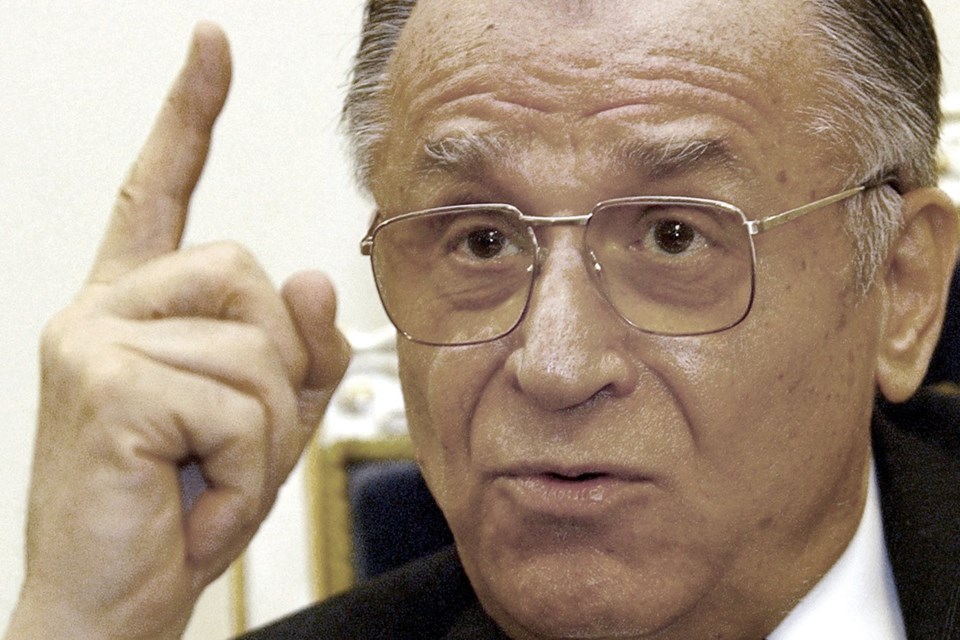BUCHAREST, Romania (AP) — Ion Iliescu, Romania’s first freely elected president after the fall of communism in 1989, who later faced charges of crimes against humanity for his role in the bloody revolution, has died. He was 95.
Iliescu, who held de facto military authority during the anti-communist revolt, assumed power after Communist dictator Nicolae Ceausescu, and his wife Elena, were executed on Dec. 25, 1989. More than 1,100 people died during the uprising, 862 of them after Iliescu had seized power. He repeatedly denied any wrongdoing.
Twice re-elected, in 1992 and 2000, Iliescu had largely withdrawn from public life by 2017. In recent years, his health had declined. In 2019, he underwent heart surgery, and was diagnosed with lung cancer in June. The hospital in the capital, Bucharest, where Iliescu had been receiving medical treatment since June 9, said on Tuesday that he died at 3.55 p.m. local time after medics “made all efforts to provide him the necessary care and treatment.”
Romania's government also confirmed his death and extended its condolences to his family and those close to the former president. It added that it would announce plans for a state funeral soon.
In a statement on its official website, Romania's Social Democratic Party, or PSD, which Iliescu founded, called it “a very sad day for Romania.”
“A prominent figure of the Romanian Revolution and the history of contemporary Romania, Mr. President Ion Iliescu will remain for all of us a symbol of the politician and statesman,” the statement read. “He had the courage to confront Ceausescu and his dictatorship, and directed Romania irreversibly on the Euro-Atlantic path.”
“He was a strong leader, loved by most, contested by others, as happens in democracy,” it added.
In 2018, military prosecutors charged Iliescu with crimes against humanity for failing to prevent “numerous situations” in which civilians were needlessly killed during the revolution. Prosecutors alleged he had spread false information through state media, creating a “generalized psychosis” that fueled chaos and bloodshed.
The charges against Iliescu, who served as a minister in the communist government until he was sidelined in 1971, refer to a five-day period during the uprising, after Ceausescu had fled Bucharest on Dec. 22, 1989. At the time of Iliescu’s death, he had never been convicted, and the case remained open.
In January this year, Iliescu’s legal woes mounted when prosecutors charged him with crimes against humanity in a second case. Prosecutors allege he implemented policies that led to a violent crackdown on civilian protesters in Bucharest in 1990, who were demanding the removal of former communists from power.
Iliescu had called on coal miners from the Jiu Valley to “restore order” in the capital. At least four people were killed.
Despite maintaining good relations with the Soviet Union until its collapse in 1991, Romania became a member of the NATO military alliance in 2004 during his last presidential term.
After his last term ended, he served as a lawmaker in the PSD, Romania’s most dominant political party since communism ended 35 years ago.
Dominic Fritz, president of the governing coalition partner Save Romania Union party, said in a post on Facebook that Iliescu’s passing “is painful not because of his departure, but because it leaves us with so many open wounds.”
“Many are still waiting for justice,” he said. “And Ion Iliescu took with him answers to questions that still plague society.”
For two decades after the revolution, Iliescu was Romania’s most consequential political figure who helped define the country’s new democratic institutions and its Constitution, said Cristian Andrei, a Bucharest-based political consultant.
“His legacy spans from the one to oust Ceausescu to being himself a break in Romania’s development and transition to full functioning democracy and market economy,” he told The Associated Press. “He was later accused by a growing number of Romanians of being the continuator of the Communist apparatus … trying to hold on to power in an authoritarian-communist style.”
After President Nicusor Dan’s victory in Romania’s tense presidential rerun in May, Iliescu congratulated the new pro-Western leader in a blog post, noting that Romania “is going through a complex period” and faces economic, social, and geopolitical challenges.
“Romania needs coherence, dialogue and a firm commitment to strengthening democratic institutions and its European path,” he said. “I am convinced that you will exercise this responsibility with dignity and a sense of duty to the nation.”
Stephen Mcgrath, The Associated Press




